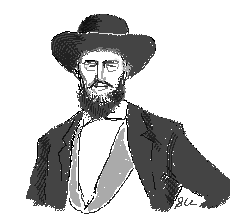

What's the Significance of Wallace's Paper?

Wallace in 1862, in Singapore
As the Editors remark, Wallace also got his idea from Malthus. The struggle for existence is severe for any species; then who survives? Wallace's answer is the same as Darwin's: any slight advantage in the struggle for existence will affect the number of individuals with that advantage. Thus, although Wallace does not have the word "Natural Selection", it is fair to say that Wallace also pointed out the principle of Natural Selection.
Moreover, Wallace is often clearer than Darwin, when it comes to the statistical character of Natural Selection.
If ... any species should produce a variety having slightly increased powers of preserving existence, that variety must inevitably in time acquire a superiority in numbers. These results must follow as surely as old age, intemperance, or scarcity of food produce an increased mortality. In both cases there may be many individual exceptions; but on the average the rule will invariably be found to hold good. ...
All we argue for is, that certain varieties have a tendency to maintain their existence longer than the original species, and this tendency must itself felt; for though the doctrine of chances or averages can never be trusted to on a limited scale, yet, if applied to higher numbers, the results come nearer to what theory demands, and, as we aproach to an infinity of examples, become strictly accurate.
Here, of course, Wallace is alluding to the law of large numbers.
In addition, Wallace also clearly pointed out that teleological explanations envisaged by Lamarck (and others) can be replaced by causal exaplanations, appealing only to efficient causes. Thus Wallace writes:
The powerful retractile talons of the falcon-and the cat-tribes have not been produced or increased by the volition of those animals; but among the different varieties which occurred in the earlier and less highly organized forms of these groups, those always survived longest which had the greatest facilities for seizing their prey. Neither did the giraffe acquire its long neck by desiring to reach the foliage of the more lofty shrubs, and constantly stretching its neck for the purpose, but because any varieties which occurred among its antitypes with a longer neck than usual at once secured a fresh range of pature over the same grounds their shorter-necked companions, and on the first scarcity of food were thereby enabled to outlive them. ... We have also here an acting cause to account for that balance so often observed in nature, ---a deficiency in one set of organs always being compensated by an increased development of some others--- ...; for it has been shown that all varieties in which an unbalanced deficiency occurred could not long continue their existence. The action of this principle is exactly like that of the centrifugal governeor of the steam engine, which checks and corrects any irregularities almost before they become evident; and in like manner no unbalanced deficiency in the animal kingdom can ever reach any conspicuous magnitude, because it would make itself felt at the very first step, by rendering existence difficult and extinction almost sure soon to follow.It is quite interesting to notice that a similar expression in terms of fly-wheel appears (within a slightly different context) in Darwin's Big Species Book, section on the principle of divergence (which was being written when Wallace paper came to Darwin):
Lastly, we have seen in our Chap. IV ... that the amount of variations, & consequently of variation in a right or beneficial direction for natural selection to seize on & preserve, will bear some relation within any given period: consequently when the descendants from any one species have become modified into very many species, without all become numerous in individuals, which [we] see hardly ever to be the case with all the species of the same genus or family, there will be a check amongst the less common species to their further modification: the lesser number of the individuals serving as a regulator or fly-wheel to the increasing rate of further modification, or the production of new specific forms. (Uchii's italics)For more on this, see my paper (1993).
References
Darwin, C. (1858) Big Species Book
Wallace, A. R. (1858) "On the Tendency of Varieties to Depart indefinitely from the Original Type"
ãˆÃŠÎyÚµªi1993ªjªuÔ`ÚÀð»É˜íÔ«÷ÿªvªwÑõãsÎŒÉwð¦ÉwðäÔÛѺÑI÷vªx32ªA43-103ªB
Last modified, December 15, 2002. (c) Soshichi Uchii
suchii@bun.kyoto-u.ac.jp